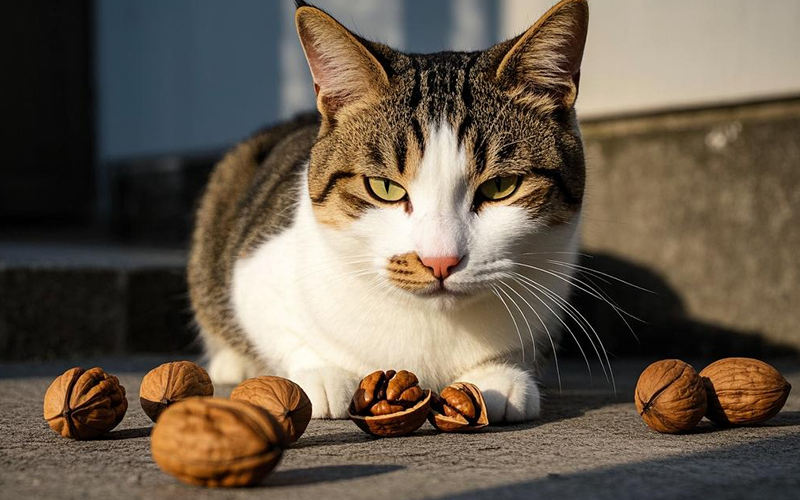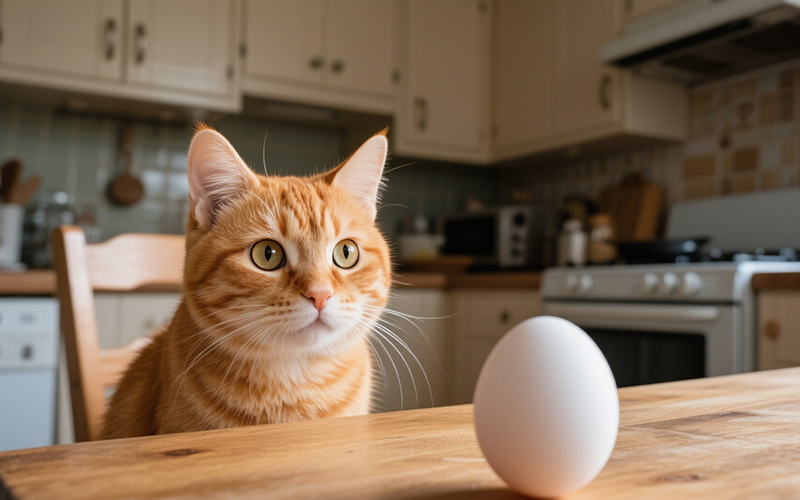Can Cats Eat Pecans? Understanding the Risks of Feeding Pecans to Cats
- 13 Mar 2025 11:39
As pet owners, we often wonder about sharing human foods with our feline friends. While some foods are safe for cats in small quantities, others can be dangerous. One food that falls into the “avoid” category is pecans. Though these nuts are commonly enjoyed by humans, they pose several risks to your cat’s health and should be kept out of their diet.
Let’s explore whether pecans are safe for cats, why they can be harmful, and what you should do if your cat eats one by accident.

Why Are Pecans Dangerous for Cats? ⚠️
Pecans belong to the tree nut family, and while they are not toxic in the same way that chocolate or onions are, they can still cause significant health problems for cats. Here are a few reasons why pecans are unsafe for felines:
High Fat Content 🥜: Pecans are high in fat, and while fat is an essential nutrient for cats, too much fat can lead to digestive upset. A cat’s digestive system is not designed to handle large amounts of fat, which can result in vomiting, diarrhea, and abdominal discomfort.
Risk of Pancreatitis 😿: Overconsumption of fatty foods like pecans can put a strain on your cat’s pancreas, potentially leading to pancreatitis. This condition causes inflammation of the pancreas, which can be very painful and may require medical treatment. Symptoms of pancreatitis in cats include loss of appetite, lethargy, vomiting, and abdominal pain.
Potential for Choking 🏚️: Pecans are hard, crunchy, and can pose a choking hazard, especially if your cat tries to swallow a piece whole. Cats are not able to chew food the same way humans do, so large or sharp pieces of nuts can get stuck in their throat, potentially causing a blockage or injury.
Toxic Fungus Risk 🍄: Like many other nuts, pecans are susceptible to mold, especially if they are stored improperly. Moldy pecans can contain mycotoxins, which are harmful substances that can cause serious poisoning in cats. If your cat consumes moldy pecans, they may exhibit symptoms like tremors, vomiting, diarrhea, and even seizures.
Symptoms of Pecans Poisoning or Digestive Issues in Cats 🚨
If your cat consumes a pecan, they may experience a range of symptoms depending on the quantity ingested and the condition of the pecan. Here are some signs to watch for:
Vomiting or diarrhea: The high-fat content can upset your cat’s stomach.
Abdominal pain: Your cat may appear uncomfortable or have a bloated abdomen.
Loss of appetite: Pecans can cause digestive issues, leading to a reduced appetite.
Lethargy: If your cat feels unwell after consuming a pecan, they may become unusually tired or inactive.
Choking or gagging: If your cat tries to swallow a whole pecan or large piece, they might choke on it, causing them to gag or cough.
If you notice any of these symptoms after your cat has eaten pecans, it’s important to contact your veterinarian immediately for advice.
What to Do If Your Cat Eats Pecans 🐾
If your cat has eaten a pecan, here are some steps to take:
Monitor Your Cat’s Symptoms 👀: Keep an eye on your cat for signs of distress. If they show any symptoms like vomiting, diarrhea, or difficulty breathing, contact your veterinarian.
Contact Your Veterinarian 🏥: Even if your cat only ate a small piece of pecan, it’s best to reach out to your vet for advice. If your cat consumes a large number of pecans, you may need to bring them to the vet for immediate care.
Avoid Inducing Vomiting ❌: Unless specifically instructed by your veterinarian, do not attempt to induce vomiting at home, as it could cause further harm.
Follow Your Veterinarian’s Advice 💊: Your vet may recommend treatments like fluids or medications to help your cat recover from any digestive upset or inflammation caused by the pecans.
Are There Safer Nut Alternatives for Cats? 🐱
While pecans are not safe for cats, there are other healthier and safer options when you want to give your cat a treat. Nuts should generally be avoided because of their high-fat content and potential for choking. However, here are some pet-friendly snack alternatives:
Cooked chicken or turkey 🍗: High in protein and safe for cats, these are ideal treats.
Small pieces of fish 🐟: Cats love fish, and it’s a good source of protein and omega-3 fatty acids.
Catnip 🌿: A safe and fun treat that many cats love, offering stimulation and enjoyment.
Cat treats 🐾: There are many specially formulated treats available that are designed to provide the necessary nutrients for your cat.
Preventing Accidental Ingestion of Pecans 🍽️
To keep your cat safe from accidentally eating pecans, here are some tips:
Store Pecans Safely 🏠: Always store nuts like pecans in sealed containers or cabinets that your cat cannot access.
Keep Pecans Out of Reach 🛑: Be mindful when eating or baking with pecans, and never leave them unattended where your cat might find them.
Educate Family and Guests 👨👩👧👦: Make sure everyone in your household is aware that pecans and other nuts are not safe for cats. This includes guests who might offer your cat food without realizing the risks.
Read Labels 📃: If you're feeding your cat any processed food, always check the ingredients to make sure there are no hidden nuts or harmful additives.
PettureX: Your Pet’s Health Assistant 🐾💻
If you're unsure about what foods are safe for your cat, or if you need assistance with pet care, PettureX is a great resource. This AI-powered pet health assistant offers 24/7 consultations, helping you make informed decisions and ensuring your cat’s well-being.
Conclusion: Can Cats Eat Pecans? 🚫
No, cats should not eat pecans. While pecans are not directly toxic, they can cause digestive upset, pancreatitis, and potentially a choking hazard. Additionally, moldy pecans can contain harmful toxins. It’s best to avoid feeding your cat any kind of nut, including pecans, and stick to safer treat options that are designed for feline consumption.
If your cat accidentally eats pecans, monitor them closely for symptoms of illness and contact your veterinarian if you have any concerns.
Related

Can Cats Eat Egg Yolk Raw? A Vet's In-Depth Guide to Feline Nutrition & Safety
- 10 Jun 2025
Can Cats Eat Dog Kibble? Unpacking the Nutritional Mismatch!
- 29 May 2025
Can Cats Eat Deli Turkey? Slicing Through the Facts for Your Feline!
- 29 May 2025
Can Cats Eat Deer Meat? Exploring Venison for Your Feline!
- 28 May 2025
Can Cats Eat Corned Beef? Unpacking This Salty Human Delicacy!
- 28 May 2025
Can Cats Eat Cooked Rice? The Grain Truth for Your Feline Friend!
- 27 May 2025
Can Cats Eat Cornbread? A Crumb of Truth for Curious Cat Owners!
- 27 May 2025
Can Cats Eat Cooked Meat? Sizzling Facts for Your Feline's Feast!
- 26 May 2025
Can Cats Eat Chili? Spicing Up the Truth About This Human Dish!
- 26 May 2025
Can Cats Eat Chicken Eggs? Cracking the Code on This Feline Food Query!
- 24 May 2025
